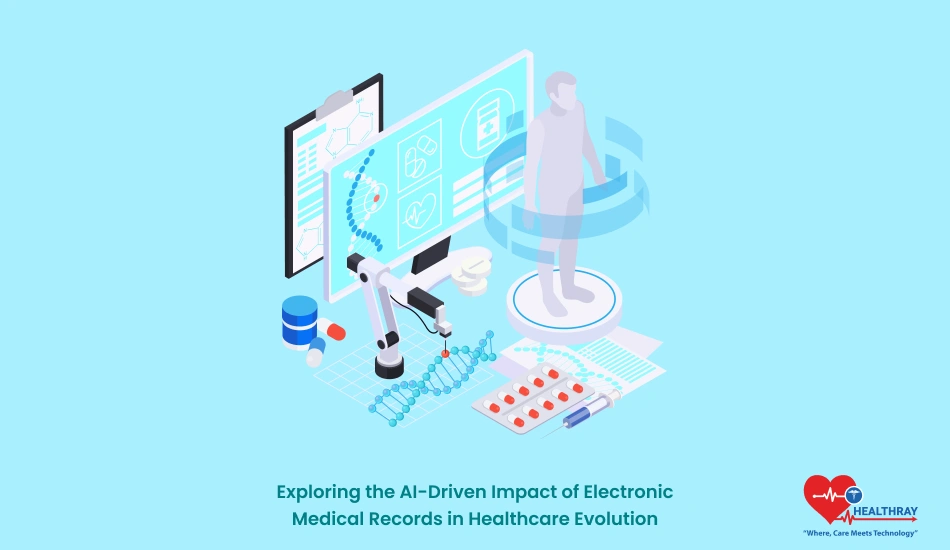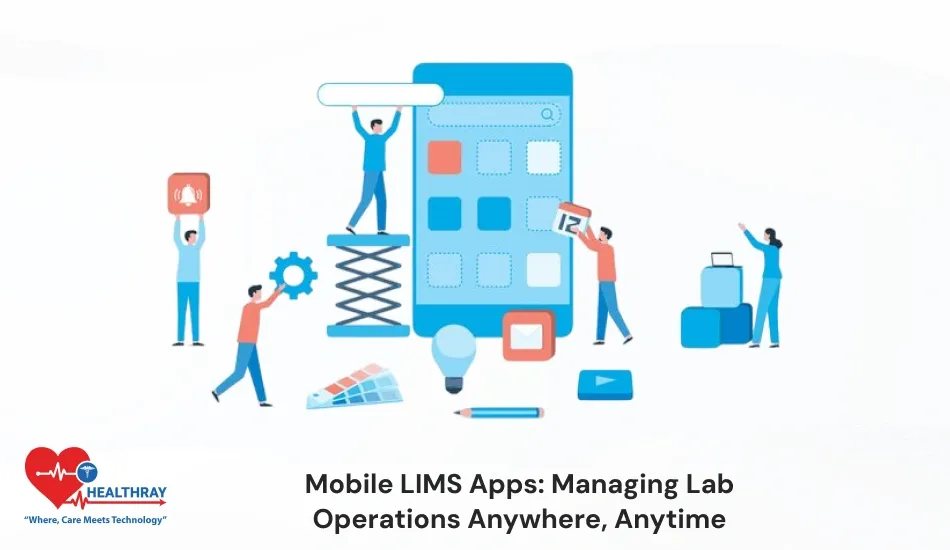In the healthcare industry, artificial intelligence (AI) is revolutionizing the field. It is changing patient care, changing how professionals use Electronic Medical Records (EMRs), and even changing how policies are made. AI helps healthcare systems make sense of the overwhelming amount of data they are dealing with. Medical decision-making becomes more accurate, workflows are streamlined, and repetitive procedures are automated.
The benefits of AI for the EMR System, its effects on medical practitioners, and the difficulties and moral dilemmas associated with its implementation are all covered in this article. There is plenty to learn about the AI revolution in healthcare records, regardless of your role as a physician, tech provider, or legislator.
Enhancing EMR Efficiency with AI
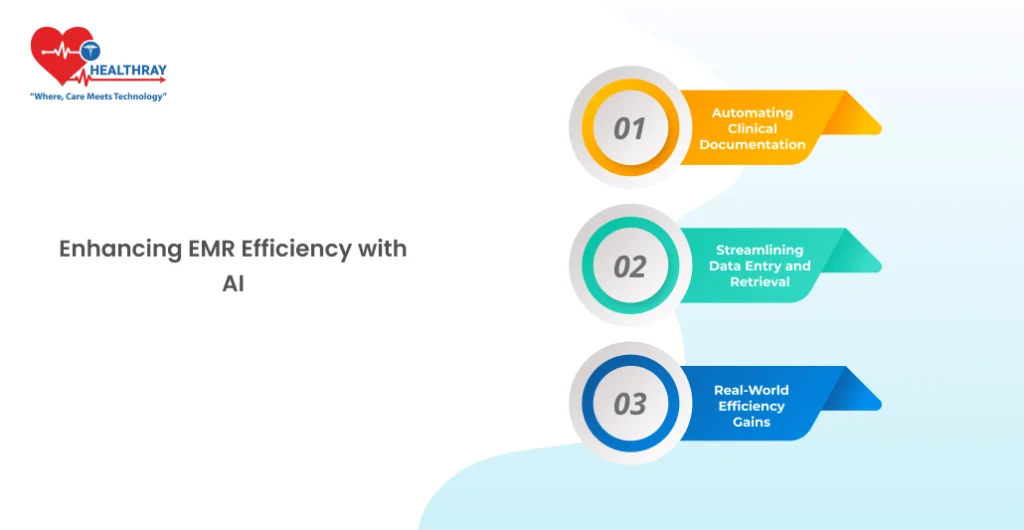
Electronic Medical Records were introduced to simplify patient data management, but they’ve often added to the workload for healthcare professionals. Enter AI. By integrating intelligent tools into EMR systems, routine tasks can be automated, saving time and reducing errors.
Automating Clinical Documentation
AI-powered tools can transcribe and organize clinical notes in real-time, allowing doctors to focus on patients instead of keyboards. These tools use natural language processing (NLP) to capture critical information from conversations, ensuring accurate records without the need for constant manual input.
Streamlining Data Entry and Retrieval
Searching through EMRs for specific patient information can be time-consuming. AI algorithms simplify this by providing instant, context-aware searches. These systems not only find what’s needed but also highlight related insights, supporting better clinical decisions.
Real-World Efficiency Gains
Hospitals and clinics using AI in EMRs report shorter patient processing times and more accurate billing. For example, some systems automatically identify missing data, flag potential coding errors, and suggest corrections, reducing administrative delays.
Improving Patient Care through AI-Driven EMRs
The ultimate goal of integrating AI into Electronic Medical Records is to enhance patient care. With AI’s ability to process and analyze vast amounts of data, it becomes a powerful ally in creating more personalized and effective treatment plans.
Personalized Treatment Plans
AI can assess patient history, genetic information, and current health data to suggest tailored treatment options. For example, it can flag potential drug interactions or recommend alternative therapies based on a patient’s unique profile, helping healthcare providers deliver more precise care.
Predictive Analytics for Better Outcomes
AI excels at spotting patterns in data. By analyzing trends in a patient’s records, it can predict potential health issues before they arise. For instance, early warning systems powered by AI can identify patients at risk for conditions like sepsis or heart failure, enabling timely intervention.
Real-Time Decision Support Systems
Doctors and nurses benefit from AI tools that provide actionable insights during consultations. These systems offer evidence-based recommendations, ensuring treatments align with the latest medical guidelines. In critical situations, having AI as a second set of “eyes” can make all the difference.
By leveraging AI in EMRs, healthcare professionals are equipped with tools to make informed decisions faster, ultimately leading to better patient outcomes.
Challenges in AI Integration with EMRs
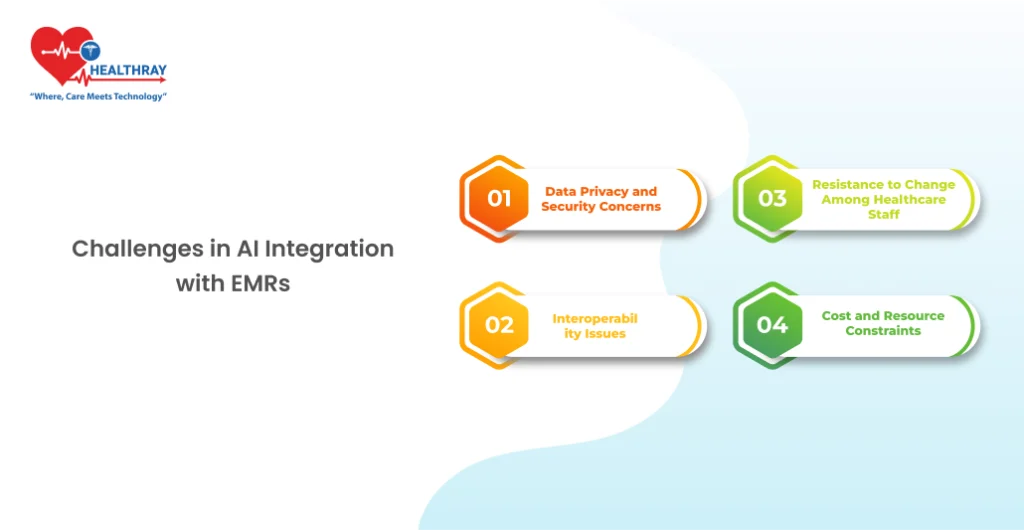
While AI brings promising advancements to Electronic Medical Records, integrating these technologies isn’t without its hurdles. From technical barriers to human resistance, several challenges need careful consideration.
Data Privacy and Security Concerns
AI systems rely on extensive data to function effectively, raising concerns about patient privacy. Storing and processing sensitive medical records require robust security measures to prevent breaches. Additionally, ensuring compliance with regulations like HIPAA and GDPR can complicate implementation.
Interoperability Issues
Healthcare systems often operate on diverse platforms, making it difficult for AI tools to integrate seamlessly with existing EMRs. Lack of standardization across systems leads to compatibility problems, limiting AI’s full potential. Bridging these gaps requires significant investment and collaboration.
Resistance to Change Among Healthcare Staff
Adopting AI technologies often involves a steep learning curve. Many healthcare professionals express hesitation or skepticism about new systems, fearing they may replace human judgment or increase their workload during the transition phase. Effective training programs and clear communication are critical to overcoming this resistance.
Cost and Resource Constraints
Implementing AI-driven EMRs requires substantial financial and technical resources. Smaller healthcare facilities, especially in underserved areas, may struggle to afford the initial investment or maintain the infrastructure required for these advanced systems.
Navigating these challenges demands a strategic approach, balancing technological innovation with the practical realities of healthcare environments.
Impact on Healthcare Professionals
AI-driven Electronic Medical Records are transforming how healthcare professionals perform their duties. By alleviating administrative burdens and enhancing decision-making, these systems are reshaping roles and responsibilities in the medical field.
Reducing Administrative Burden
One of the biggest pain points for healthcare professionals is the time spent on documentation. AI-powered EMRs take over repetitive tasks such as data entry and report generation. This allows doctors and nurses to spend more time with patients, improving the quality of care and job satisfaction.
Shifting Roles and Responsibilities
AI tools enable healthcare workers to focus more on clinical expertise rather than administrative tasks. For instance, AI-assisted diagnostic tools provide insights that help professionals validate decisions, not replace them. This shift encourages collaboration between humans and technology rather than competition.
Training and Adaptation Challenges
Adapting to AI systems requires proper training and ongoing support. For many professionals, the transition can feel daunting, especially when workflows are disrupted. Institutions that invest in training programs and provide hands-on learning opportunities can ease the adjustment process significantly.
Enhancing Confidence in Decision-Making
AI systems equipped with decision-support features act as a safety net, especially in high-pressure situations. They help professionals cross-check their choices against a wealth of clinical data, increasing accuracy and confidence without undermining their expertise.
By making day-to-day tasks easier, AI-driven EMRs empower healthcare professionals to focus on what matters most—providing excellent patient care.
Policy and Ethical Considerations
As AI-driven EMR systems become more widespread, policymakers and healthcare leaders must address a range of ethical and regulatory concerns. These considerations ensure that AI is implemented responsibly and equitably across the healthcare sector.
Regulatory Frameworks for AI in Healthcare
Governments and healthcare organizations need clear policies that outline how AI tools can be used in EMRs. These frameworks must address issues like data usage, algorithm transparency, and accountability for errors. Establishing standardized guidelines helps foster trust among healthcare providers and patients.
Ethical Implications of AI Decision-Making
AI systems sometimes make recommendations or decisions that could significantly impact patient care. Questions arise about who is responsible when an AI-driven suggestion leads to an error. Balancing human oversight with AI autonomy is a critical ethical challenge.
Ensuring Equitable Access to AI Technologies
Not all healthcare facilities have the resources to implement AI-driven EMRs. Policymakers must address disparities to ensure these technologies don’t widen gaps in healthcare access. Funding initiatives, subsidies, and public-private partnerships can play a role in leveling the playing field.
Patient Consent and Data Ownership
AI relies heavily on patient data, making it essential to prioritize informed consent. Patients should have clarity about how their data is being used and retain some control over it. Policies should emphasize transparency and ensure data isn’t exploited for non-medical purposes.
Mitigating Bias in AI Systems
AI systems are only as unbiased as the data they are trained on. If historical data contains biases, these can perpetuate inequities in healthcare outcomes. Policymakers must push for diverse and representative datasets to minimize this risk.
Addressing these policy and ethical considerations is vital to creating a healthcare environment where AI technologies are trusted and beneficial to all stakeholders.
Future Prospects of AI in EMRs
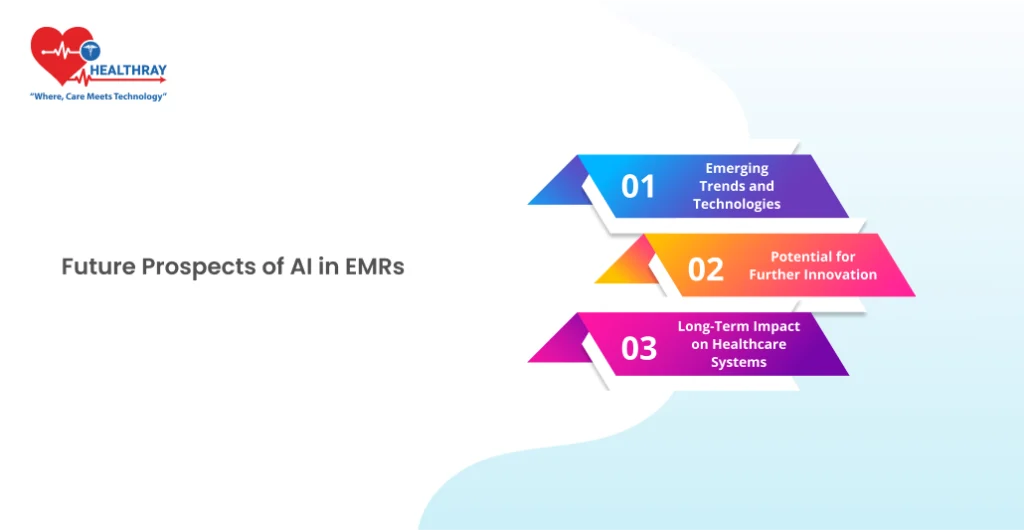
The future of Electronic Medical Records lies in AI’s ability to push boundaries. Emerging technologies promise to make EMR systems even smarter, more intuitive, and better suited to support healthcare professionals and improve patient outcomes.
Emerging Trends and Technologies
AI integration in EMRs is moving toward predictive analytics and real-time monitoring. For example, machine learning models are being developed to anticipate patient needs, such as predicting hospital readmissions or detecting early signs of chronic diseases. Wearable devices and IoT technologies are expected to feed data into EMR systems, creating a more holistic view of patient health.
Potential for Further Innovation
Beyond improving current workflows, AI-driven EMRs are paving the way for entirely new approaches to healthcare. Virtual health assistants, for instance, could guide patients through post-treatment care plans directly from their records. Similarly, integrating AI with telemedicine platforms could enable remote diagnoses with greater accuracy.
Long-Term Impact on Healthcare Systems
AI promises to transform EMRs from static databases into dynamic tools that actively contribute to patient care. Over time, this evolution could lead to a more preventive healthcare model, where insights from EMRs help patients avoid illnesses altogether. Furthermore, as interoperability improves, healthcare systems across the globe may become more unified, fostering collaborative research and innovation.
The road ahead for AI in EMRs is filled with opportunities to revolutionize how healthcare is delivered. However, realizing this potential requires a balance of innovation, ethical practices, and collaboration among stakeholders.
Conclusion
Artificial intelligence is reshaping how Electronic Medical Records are managed, used, and understood in healthcare. By enhancing efficiency, improving patient care, and reducing administrative burdens, AI-driven EMRs are transforming the daily lives of healthcare professionals. However, challenges such as data privacy, interoperability, and equitable access must be addressed to unlock their full potential.
As policymakers, tech providers, and healthcare professionals collaborate to integrate AI into EMR systems, the focus must remain on ethical practices, clear regulations, and patient-centered care. The future holds immense promise, and with thoughtful planning, AI-driven EMRs can pave the way for a more efficient, equitable, and proactive healthcare system.
